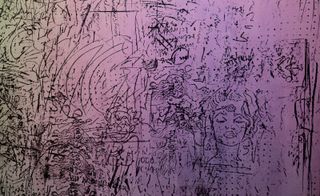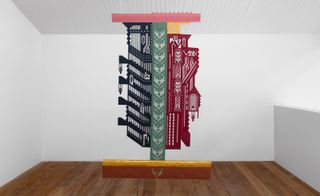When art galleries decide to broaden their horizons, they often open new outposts in one of the major art destinations, from New York to Paris or Hong Kong. For Gathering, a gallery founded in London in 2022 to platform the work of emerging artists and those with less conventionally commercial practices, the unconventional next step is Ibiza. Newly opened on the relaxed north side of the famous party island, Gathering Ibiza features a high-ceilinged gallery space with two mezzanine floors; an outdoor restaurant, Mira; and a bar designed by artist Tai Shani, complete with bright pink stools, blown-glass breast-shaped lights, and a marble-esque façade.
‘Ibiza’s contemporary art scene is emerging, very much in line with Gathering as a gallery,’ says Alex Flick, the founder of the space. ‘The island has grown exponentially in the last 50 years, from secret hippie hotspot to clubbing destination to now a year-round home for creative people from across the world. Elements of all these incarnations of the island have remained to this day, and I love the beautiful mix of people it brings.’
Gathering Ibiza, ‘front and centre of a growing art scene‘

Rannva Kunoy, aksh3|||)(, 2024, detail
(Image credit: Courtesy of the gallery)
The inaugural exhibition, ‘Substance’, unites three artists who each harness the mercurial power of physical materials. The wall-hung works of Kristian Kragelund, Rannva Kunoy and Jennifer Tee morph and shift as viewers move around them. Tee’s intricate collages at first seem to be made from marbled cutouts of paper, but they are in fact painstakingly created from real tulip petals, with rich streaks of red, purple and yellow running down their lengths. From a distance, Kragelund’s abstract geometric works seem to be formed from hundreds of delicate threads. As the viewer moves closer, these are revealed to be sturdy panels of fibreglass, a famously tough material that is dangerous to human touch. Kunoy’s pigment and lacquer paintings have an oil-like sheen, their colours blending between purple, green and pearlescent white when viewed from different angles.
These are each complex works, which make sculptural use of their materials. These materials are also woven through with symbolic and historical significance. Tee began working with tulip petals in 2017, bringing together her Dutch and Chinese Indonesian heritage by applying the iconic flower of her birth country to traditional textile designs from the Lampung region of southern Sumatra, Indonesia. These are often woven through with recurring motifs; ships, for example, represent both geographical travel and the journey from life to death.

Jennifer Tee, installation view, ‘Substance’, at Gathering Ibiza, 2024
(Image credit: Courtesy of the gallery)
Kragelund’s work explores the subliminal violence that is embedded into the objects and structures within our everyday lives, often using industrial debris and the materials of commercial production. Kunoy similarly utilises an industrial material that signifies the opulence of late-capitalism, in her work with crystal enamel paint, which is typically employed for luxury car bodies. ‘It was an opportunity to work with three artists whom I greatly admire but are not part of our represented programme,’ says Flick. ‘They each liked the concept and the other artists, all of which are painters who don’t use a brush.’
The gallery will next be showing a dual exhibition of Bruce Nauman and Stefan Brüggemann – who has a bespoke home and studio building in Ibiza’s nearby hills – during CAN Art Fair. Haunted by a Million Suns, an illuminated candle sculpture by Tai Shani, will also be on permanent display outside the gallery, alongside her bar. ‘We are the first gallery from the UK and only the second gallery in general to have a space on the island,’ says Flick. ‘Being front and centre of a growing art scene is exciting for me, the gallery and, very importantly, the artists.’
‘Substance’, a group show featuring works by Kristian Kragelund, Rannva Kunoy and Jennifer Tee, is at Gathering Ibiza until 20 June 2024
gathering.london




